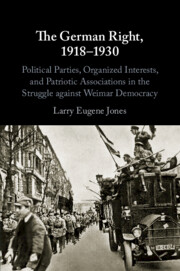 The German Right, 1918–1930
The German Right, 1918–1930 Book contents
- The German Right, 1918–1930
- The German Right, 1918–1930
- Copyright page
- Dedication
- Contents
- Figures
- Acknowledgments
- Abbreviations
- Introduction
- 1 Revolution and Realignment
- 2 Infrastructure of the German Right
- 3 Forging a Conservative Synthesis
- 4 Growth and Consolidation
- 5 The Radical Right
- 6 1923 – A Missed Opportunity?
- 7 From Triumph to Schism
- 8 Stabilization from the Right?
- 9 Paladins of the Right
- 10 A Resurgent Nationalism
- 11 The Road Back to Power
- 12 The Burden of Responsibility
- 13 From Defeat to Crisis
- 14 Reverberations and Realignment
- 15 The Chimera of Right-Wing Unity
- 16 Schism and Fragmentation
- 17 The Brüning Gambit
- 18 The September Earthquake
- Epilogue
- Select Bibliography
- Index
16 - Schism and Fragmentation
Published online by Cambridge University Press: 21 March 2020
- The German Right, 1918–1930
- The German Right, 1918–1930
- Copyright page
- Dedication
- Contents
- Figures
- Acknowledgments
- Abbreviations
- Introduction
- 1 Revolution and Realignment
- 2 Infrastructure of the German Right
- 3 Forging a Conservative Synthesis
- 4 Growth and Consolidation
- 5 The Radical Right
- 6 1923 – A Missed Opportunity?
- 7 From Triumph to Schism
- 8 Stabilization from the Right?
- 9 Paladins of the Right
- 10 A Resurgent Nationalism
- 11 The Road Back to Power
- 12 The Burden of Responsibility
- 13 From Defeat to Crisis
- 14 Reverberations and Realignment
- 15 The Chimera of Right-Wing Unity
- 16 Schism and Fragmentation
- 17 The Brüning Gambit
- 18 The September Earthquake
- Epilogue
- Select Bibliography
- Index
Summary
Chapter 16 explores the tensions within the DNVP that culminated in the secession of twelve moderates from the DNVP Reichstag delegation in December 1929. It begins with an examination of Christian-Social dissent in the DNVP and moves from there to a discussion of Hugenberg’s efforts to unify a badly divided party behind the mantra of anti-Marxism at the annual party congress in Kassel in late November. These efforts were to little avail, and in the vote on the controversial imprisonment paragraph of the so-called “Freedom Law” twenty-three DNVP deputies either voted No or were absent for the vote. In the aftermath twelve DNVP deputies left the party. While the young conservatives around Treviranus struggled desperately to preserve a modicum of unity among the secessionists, they were foiled both by the CNBLP’s determination to effect a realignment of the German party system along vocational and corporatists lines and by the decision of the Christian-Socials to launch a new party of their own. In the meantime, Hugenberg continued to enjoy strong support at the local and regional levels of the DNVP party organization and experienced little difficulty in retaining control of the party.
Keywords
- Type
- Chapter
- Information
- The German Right, 1918–1930Political Parties, Organized Interests, and Patriotic Associations in the Struggle against Weimar Democracy, pp. 493 - 523Publisher: Cambridge University PressPrint publication year: 2020
